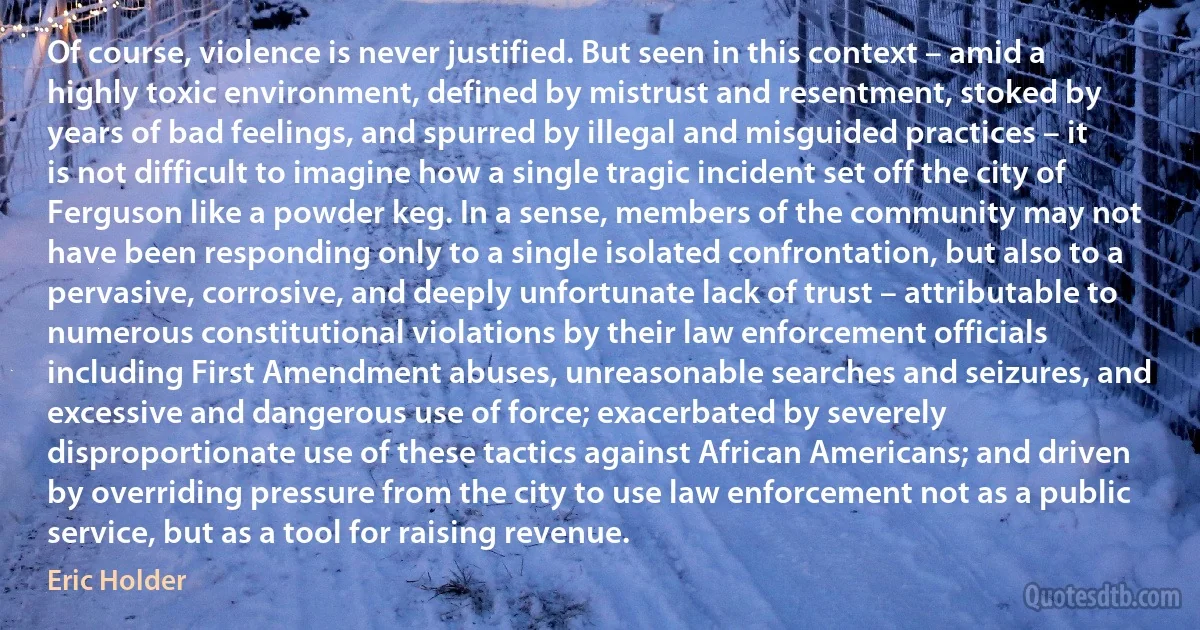
Of course, violence is never justified. But seen in this context – amid a highly toxic environment, defined by mistrust and resentment, stoked by years of bad feelings, and spurred by illegal and misguided practices – it is not difficult to imagine how a single tragic incident set off the city of Ferguson like a powder keg. In a sense, members of the community may not have been responding only to a single isolated confrontation, but also to a pervasive, corrosive, and deeply unfortunate lack of trust – attributable to numerous constitutional violations by their law enforcement officials including First Amendment abuses, unreasonable searches and seizures, and excessive and dangerous use of force; exacerbated by severely disproportionate use of these tactics against African Americans; and driven by overriding pressure from the city to use law enforcement not as a public service, but as a tool for raising revenue.
Eric HolderRelated topics
african bad city confrontation constitutional context corrosive course drive enforcement force lack law off overriding public responding seen sense service set single spur tactics trust unfortunate use yearsRelated quotes
The concept of peace is easy to grasp; that of international security is more complex, for a pattern of contradictions has arisen here as well. As major nuclear Powers have begun to negotiate arms reduction agreements, the proliferation of weapons of mass destruction threatens to increase and conventional arms continue to be amassed in many parts of the world. As racism becomes recognized for the destructive force it is and as apartheid is being dismantled, new racial tensions are rising and finding expression in violence. Technological advances are altering the nature and the expectation of life all over the globe. The revolution in communications has united the world in awareness, in aspiration and in greater solidarity against injustice. But progress also brings new risks for stability: ecological damage, disruption of family and community life, greater intrusion into the lives and rights of individuals.

Boutros Boutros-Ghali
[My] approach recognizes the basic principle of a written Constitution. We "the people" adopted a written Constitution precisely because it has a fixed meaning, a meaning that does not change. Otherwise we would have adopted the British approach of an unwritten, evolving constitution. Aside from amendment according to Article V, the Constitution's meaning cannot be updated, or changed, or altered by the Supreme Court, the Congress, or the President. Of course, even when strictly interpreted as I believe it should be, the Constitution remains a modern, "breathing" document as some like to call it, in the sense that the Court is constantly required to interpret how its provisions apply to the Constitutional questions of modern life. Nevertheless, strict interpretation must never surrender to the understandably attractive impulse towards creative but unwarranted alterations of first principles.

Clarence Thomas
How you deal with it I must and will leave to you, not out of despair or resignation but in deference to my conscience, that broken clock which I believe is now chiming one of its occasional right hours. I will not question your reasons. It is enough for you to tell me that you wish to keep this distance between us, and it will always be enough. Know that a single word will bring me running, but unless and until it pleases you to give it, I will expect nothing, force nothing, and contrive nothing contrary to your wishes.
I desire you as deeply as I ever have, but I understand that the fervor of a desire is irrelevant to its justice. I want your heart on merit, in mutual trust, or not at all, because I cannot bear to see you made uneasy by me. Not for all the world would I do so again, and I leave it to you to tell me how to proceed, if and when you can, if and when you will.

Scott Lynch
Nietzsche proposes the following brilliant hypothesis: The bad conscience is the deep-seated morbid condition that declared itself in man under the stress of the most radical change he has ever experienced when he found himself imprisoned in perpetuity within a society which was in- violable. All the strong and savage instincts such as adventurousness, rashness, cunning, rapacity, lust of power, which till then had not only been honoured, but actually encouraged, were suddenly put down as dangerous, and by degrees branded as immoral and criminal. Creatures adapted to a roving life of war and adventure suddenly saw all their instincts classed as worthless, nay, as forbidden. An immense despondency, a dejection without parallel, then took possession of them. And all these instincts that were not allowed an outward vent, turned inwards on the man himself feelings of enmity, cruelty, ... violence, persecution, destruction and thus the bad conscience originated.

Georg Brandes
It is in the nature of a teenager to want to destroy. The destructive impulse is universal among children of all ages, rises to a peak of vividness, ingenuity and fascination in adolescence, and thereafter never entirely goes away. Violence and hatred, and the fear of our own inability to control them in ourselves, are a fundamental part of our birthright, along with altruism, creativity, tenderness, pity and love. It therefore requires an immense act of hypocrisy to stigmatize our young adults and teenagers as agents of deviance and disorder. It requires a policy of dishonesty about and blindness to our own histories, as a species, as a nation, and as individuals who were troubled as teenagers, and who will always be troubled, by the same dark impulses. It also requires that favorite tool of the hypocritical, dishonest and fearful: the suppression of constitutional rights.

Michael Chabon
